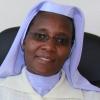An interview with Cara Weidinger, 20, a student at St. John's University in New York who participated in the People's Climate March.
"There is no fear in love, but perfect love drives out fear because fear has to do with punishment, and so one who fears is not yet perfect in love."
Pope Francis’ message to South African bishops, “Violence against women harms society,” comes at a time when Kenyan women continue to fall prey to new laws that continue to destabilize their efforts “to stand and be equally counted.” All said and done, women need to be empowered. When they are economically and socially empowered, they become a potent force for change. But change must start with the women themselves. They must fight for their own rights.
Three Stats and a Map - For decades, Mexico has been embattled in drug and crime wars that have claimed the lives of countless people. In September, Mexico became a “nation in mourning” after 43 college students went missing – and some are accusing José Luis Abarca, the mayor of the city where the students went missing, and his wife.
GSR Today - This time of year is filled with national and family rituals ushering in the New Year filled with hopes. In many parts of our world people do indeed feel doomed and hopeless about their children’s futures. Some are prisoners in their own homes as war is waged around them with no place to go if they leave. Some are imprisoned in refugee camps for life. Sisters worldwide are often bearers of hope for the suffering these circumstances.
Adelaide Ndilu is a member of the Sisters of the Immaculate Heart of Mary in Kenya. After careers as teacher, administrator, and secretary, she studied mass communication. She now produces stories on church and justice topics for Radio Waumini, a Nairobi Catholic radio station.
Light streams through the ancient stained glassed windows into the silent chapel. Quiet figures steady their wavering bodies, grasping the familiar chair, coming to rest in the hallowed space. Ready, ready are the pure white cloths, the corporal in its chaste folds, the cup, golden in the morning sun, the sisters in their irrevocable places. Slowly they gather, these women of the Lord.
Three days before her ordination as Kansas City's first woman priest, Georgia Walker sat in the storefront office of Journey to New Life, the organization she co-founded in 2013 to help people in the city re-enter civilian life after incarceration. Looking out on Troost Avenue, a street long considered the line in Kansas City's racial divide, Walker pondered the line she was about to cross. Having previously been arrested and tried in federal court for protesting nuclear weapons, Walker is no stranger to controversy. Yet, she said she was somewhat surprised by the celebrity incurred by her decision to be ordained by the Association of Roman Catholic Women Priests.
"I am in awe of God’s intimate closeness and enduring faithfulness."
GSR Today - A banner year for women's issues in journalism, 2014 brought forward into the cultural conversation this basic fact: As human beings, women are worthy of respect in every aspect of life. No caveats. No questions. No debate. We didn’t phrase it quite so overtly here at GSR, but in essence, we’ve spent every day since our April launch saying exactly that.




